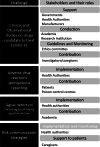The Impact of the COVID-19 "Infodemic" on Drug-Utilization Behaviors: Implications for Pharmacovigilance
- PMID: 32572842
- PMCID: PMC7307939
- DOI: 10.1007/s40264-020-00965-w
The Impact of the COVID-19 "Infodemic" on Drug-Utilization Behaviors: Implications for Pharmacovigilance
Abstract
The coronavirus disease 2019 (COVID-19) pandemic that hit the world in 2020 triggered a massive dissemination of information (an "infodemic") about the disease that was channeled through the print, broadcast, web, and social media. This infodemic also included sensational and distorted information about drugs that likely first influenced opinion leaders and people particularly active on social media and then other people, thus affecting choices by individual patients everywhere. In particular, information has spread about some drugs approved for other indications (chloroquine, hydroxychloroquine, nonsteroidal anti-inflammatory drugs, angiotensin-converting enzyme inhibitors, angiotensin II receptor antagonists, favipiravir, and umifenovir) that could have led to inappropriate and therefore hazardous use. In this article, we analyze the rationale behind the claims for use of these drugs in COVID-19, the communication about their effects on the disease, the consequences of this communication on people's behavior, and the responses of some influential regulatory authorities in an attempt to minimize the actual or potential risks arising from this behavior. Finally, we discuss the role of pharmacovigilance stakeholders in emergency management and possible strategies to deal with other similar crises in the future.
Conflict of interest statement
Marco Tuccori, Irma Convertino, Sara Ferraro, Emiliano Cappello, Giulia Valdiserra, Daniele Focosi, and Corrado Blandizzi have no conflicts of interest that are directly relevant to the content of this article.
Figures
References
-
- Siordia JA. Epidemiology and clinical features of COVID-19: a review of current literature. J Clin Virol [Internet]. 2020;127:104357. http://www.ncbi.nlm.nih.gov/pubmed/32305884. - PMC - PubMed
-
- Guo J, Huang Z, Lin L, Lv J. Coronavirus disease 2019 (COVID-19) and cardiovascular disease: a viewpoint on the potential influence of angiotensin-converting enzyme inhibitors/angiotensin receptor blockers on onset and severity of severe acute respiratory syndrome coronavirus 2 Infe. J Am Heart Assoc. England; 2020;9:e016219. - PMC - PubMed
MeSH terms
LinkOut - more resources
Full Text Sources



